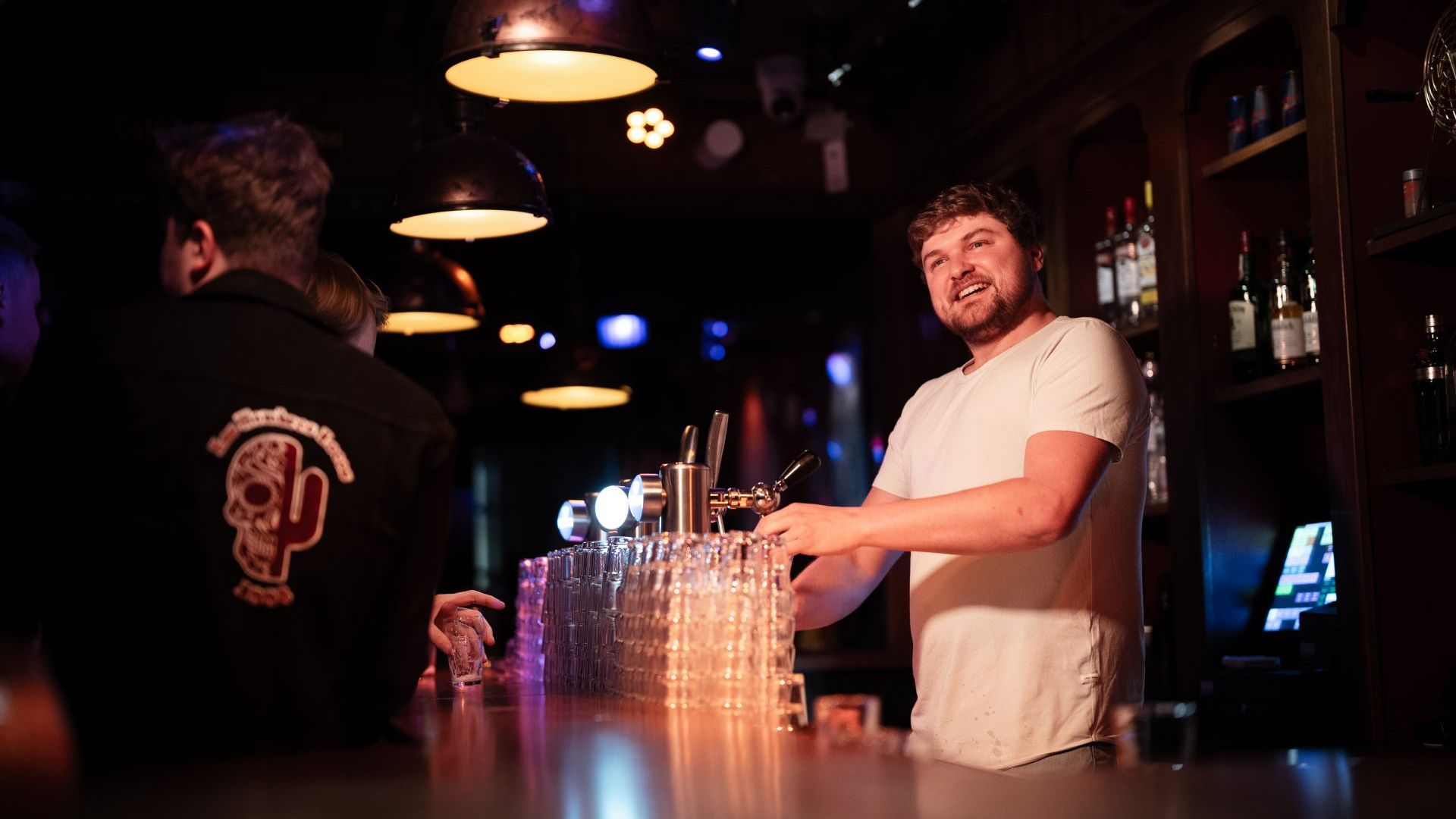The golden formula for a real student pub? According to pub owners, it doesn’t exist
-
 Julian van Doornen is sinds 2019 uitbater van Café TweeKeerBellen. Foto: Johannes Fiebig
Julian van Doornen is sinds 2019 uitbater van Café TweeKeerBellen. Foto: Johannes Fiebig
Nijmegen's bars come up with all sorts of things to attract students. Agreements with fraternities, sororities and associations are crucial for their survival. But more is needed to survive as a student bar. 'Our strength is that we don't innovate.'
Wednesday evening at nine o’clock. It’s drizzling, the Nijmegen city center is almost deserted after carnival. But in front of Café Van Rijn, there’s a group of students in burgundy polo shirts or with matching ties. One of them has climbed onto a terrace table and is shouting slogans to the others, who respond enthusiastically.
A little further, Café De Fuik is completely empty, except for some members of the R.E.I.N.A.E.R.T. dispute. The same scene at TweeKeerBellen: it’s quiet, but with members of Los Hombres Locos standing at the bar and playing dice games, there’s a bit of activity.
Discounts
Students are indispensable for Nijmegen’s hospitality industry. So, pub owners do everything they can to attract them. Associations, fraternities, sororities, and sports clubs are tempted to connect to a cafe in exchange for a jacket, shirt, discount, or a contribution to the club’s funds.

The groups arrive early in the evening so that the cafe starts bustling early. And crowds attract new visitors, as they know in the hospitality industry. There’s also hope that students will come back another time without their fraternity or sorority.
As the early evening drinks come to an end and the night begins, a new battle for the student ensues. Which bar offers the best entertainment and attracts the most people? Beer bingo, meter Monday, crocodile Tuesday, dice games, spinning the wheel, and other promotions are meant to entice the youth. ‘Running a bar solely for students as an audience is difficult,’ says owner Tinus Weijkamp. ‘They’re often not there on weekends. A party bar with only students might work.’
Weijkamp (37) was a co-owner of Café Van Ouds on Augustijnenstraat for ten years. He and a group of friends from his business administration studies bought the cafe in 2013. They sold it again in March 2023. Nowadays, Weijkamp is a co-owner of restaurant and club De Achtertuin on the Vasim site.
‘The idea that Thursday evening is the student night is outdated’
He never became rich with Van Ouds, he says. It was mainly a hobby; the friends enjoyed running their own business. ‘We all had other jobs, and when we started having families, it became a chore. So, we sold the cafe.’
Eighteen-year-olds
While some bid farewell to nightlife, others step in. Julian van Doornen (31) took over Café TweeKeerBellen (‘TKB’) in 2019 with a partner. In the same year, Niek van Dalen (30) bought into Café De Fuik. While Van Ouds targeted only partying students, TKB and De Fuik aim to keep them throughout the night.
Ninety percent of De Fuik’s visitors are between 18 and 23 years old. The crowd gets slightly older from Thursday onwards. On weekends, the young crowd disappears completely. ‘The idea that Thursday evening is the student night is outdated,’ says Van Doornen. Nowadays, it’s Wednesday, he says.
‘The year after the lockdown was crazy, it was packed every night’
Without students, TKB couldn’t survive, says Van Doornen. ‘We’d be done. My father invested with me. At the notary, he asked about the risks I might face. I joked that the sudden closure of the university and college was the only risk. But when would that ever happen?’
And then came Corona. The hospitality entrepreneurs survived with government support. The year after the lockdown was crazy, says Van Dalen of De Fuik. ‘It was packed every night. All you had to do was open the door. Now things have normalized, and we have to make an effort to attract people again.’
Advantage
De Fuik has agreements with about ten associations, fraternities, and sororities. In exchange for sponsorship or discounts, they hold their regular gatherings in the cafe on Eerste Walstraat. ‘Every agreement is different,’ says Van Dalen. ‘We’re open every day, so ten groups isn’t too much.’

TKB has three fraternities and sororities in the establishment every Wednesday. ‘There shouldn’t be too many because then I’d have more than sixty people inside,’ says Van Doornen. ‘That’s okay, but we also want space for other guests.’
Monday and Tuesday have historically been the quietest nights in Nijmegen’s nightlife. That means the battle for the students who still want a drink is fiercest then. ‘There’s only enough crowd for two full bars in the city on those nights, and everyone wants those people,’ explains Van Dalen.
So, on Mondays, De Fuik offers discounts on a meter of beer, TweeKeerBellen hosts the popular beer bingo, and the Bieb on Molenstraat – run by the Priapus fraternity – has ‘stack Monday,’ where more beer means more discounts. On Tuesdays, De Fuik offers discounts on the shot crocodile drinking game, and TKB also has enough drinking games to entertain the crowd.
Golden formula
A golden formula for a student cafe to last long in Nijmegen doesn’t seem to exist. However, there are things that help. For example, the bosses of TKB and De Fuik prefer to have students behind the bar. It’s a way to make peers feel at home.
Van Dalen of De Fuik consciously keeps his distance. ‘I shouldn’t put on a mask and pretend to be very young. My challenge is to attract the audience; the staff connects with them. That’s how we’re future-proof.’
TKB owner Van Doornen also only stands behind the bar one or two evenings. ‘This way, we can continue for another twenty years. Our strength is that we don’t innovate. The only question is how long I can keep this up.’
Traditional pub
According to Van Dalen, the concept of a traditional pub that changes little is still successful. He shows a newspaper photo from 1991 on his phone, displaying the interior of De Fuik: there’s hardly any difference. ‘The decor is basically nobody’s taste, and that’s why everyone feels at home there.’
Changing as little as possible, Van Doornen also swears by it. ‘We had a DJ for a while, but they disappeared pretty quickly. We just want guests to come to the bar and request a song the old-fashioned way.’
At the same time, you have to keep up with the times, says Van Dalen. While Tweekeerbellen keeps the DJ out, De Fuik occasionally has one. ‘And sometimes you even hear techno, which used to be really not done.’
Diversity
It’s hard to say how students make their choices, why they prefer settling in café A over pub B. ‘At night, they mainly check social media to see where the others are,’ says Van Dalen. ‘The atmosphere, the crowd, and the price of drinks determine where they go.’
Cafes near Molenstraat are inherently advantaged. Van Dalen: ‘People don’t walk all the way to Grotestraat to see if there’s anything going on. They keep hanging out in this neighborhood where we, TweeKeerBellen, Bascafé, Van Rijn, and De Bieb are located.’ Anyone outside of that area needs to come up with something unique to attract students, says Weijkamp.
Van Dalen sees a lot of casualness. ‘People who go out prefer not to commit in advance. And some prefer to save for big festivals rather than spending weekly in the pub.’
‘Students can deter other customers’
Cafés that want to attract a diverse audience – not just students – must consciously focus on this in their promotional activities. Because, as Weijkamp knows, students can deter other customers. Reflecting on his time at Van Ouds: ‘When we got older and wanted to change the atmosphere a bit, we didn’t renew agreements with some associations. Those who still fit in with the pub stayed, but if you wanted to shout with your tie on, you were better off somewhere else.’
The idea that students will ever abandon the bars at night is unimaginable for the owners. ‘There are always fluctuations: study pressure, costs, and housing shortages play a role in that,’ Van Dalen concludes. ‘But students love going out and being together. In Nijmegen, that’s possible.’
Translated by Siri Joustra



